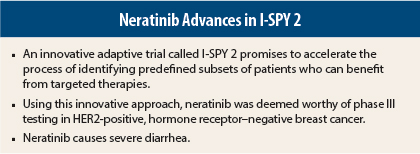In the targeted-therapy era, it is important to identify subsets of patients who can benefit from novel agents and combinations as quickly as possible. The I-SPY 2 trial is designed to expedite this goal and to change the way that targeted agents are studied and approved. This innovative adaptive trial design evaluates new therapies in specific biomarker-designed subsets of patients, and identifies “graduates” that deserve phase III study.
The first results of I-SPY 2, presented at the 2013 San Antonio Breast Cancer Symposium, identified veliparib/carboplatin added to standard neoadjuvant therapy as the first regimen to graduate for the signature of triple-negative breast cancer.1 The second graduate—neratinib (a small-molecule inhibitor of HER2) plus standard neoadjuvant therapy in HER2-positive, hormone receptor–negative breast cancer—was announced at the 2014 Annual Meeting of the American Association for Cancer Research (AACR) in San Diego.2 That combination will now move to phase III testing in HER2-positive, hormone receptor–negative breast cancer.
Key Findings
“I-SPY 2 is designed to accelerate the process of identifying drugs that are effective for breast cancer subtypes and to reduce the cost, time, and numbers of patients needed to get effective drugs to market,” stated John W. Park, MD, Professor of Medicine at the USCF Helen Diller Family Comprehensive Cancer Center in San Francisco. Dr. Park presented results of I-SPY 2 at the AACR meeting.
Results of I-SPY 2 showed that the combination of neratinib plus standard neoadjuvant therapy achieved a pathologic complete response rate of 56% vs 33% among patients treated with chemotherapy alone. Researchers found that the regimen had a 95% probability of superiority vs standard therapy and a 79% likelihood of success vs trastuzumab (Herceptin) plus paclitaxel in a phase III trial.
Neratinib did not show promise in any of the other biomarker-defined subsets of breast cancer evaluated in I-SPY 2, and the drug was associated with a high frequency of diarrhea, which was often severe and required supportive care.
I-SPY 2 uses a prespecified and automated algorithm, and randomization probabilities are updated as the study proceeds, according to biomarker signature, magnetic resonance imaging, and pathologic complete response results. Randomization is based on performance of regimens within eight biomarker subtypes/signatures. Theoretically, an agent is eligible for graduation in 10 clinically relevant signatures.
Study Details
The study enrolls patients with stage II breast cancer and tumor size of a least 2.5 cm considered at high risk for early recurrence according to MammaPrint results. The algorithm randomly assigned 116 patients to the arm of the trial testing neratinib, a pan-HER inhibitor.
Pathologic complete response rates on the neratinib arm were compared with those of 78 patients concurrently randomized to the control arm treated with standard chemotherapy, for all 10 predefined biomarker signatures. The probability of superiority to control and success in a phase III trial are calculated by a specially designed model for this trial.
Principal investigators for I-SPY 2 are Laura J. Esserman, MD, Professor of Surgery and Radiology and Director of the Carol Frank Buck Breast Care Center at USCF Helen Diller Family Comprehensive Cancer Center, San Francisco, and Donald A. Berry, PhD, Professor of Biostatistics at The University of Texas MD Anderson Cancer Center and founder of Berry Consultants, Houston.
Need for Biostatistical Support
Thomas J. Lynch, MD, who moderated a press conference where these data were presented, said that this approach promises to be more efficient than previous models of clinical trials. “This approach reduces the number of patients treated with older therapies and increases the number of patients who will be treated with more innovative therapies,” he said. He noted that the adaptive randomization design depends on adequate biostatistical support, which could be a limitation. Dr. Lynch is Director of the Yale Cancer Center in New Haven, Connecticut. ■
Disclosure: I-SPY 2 is sponsored by Quantum Leap Healthcare Collaborative, a 501(3)C charitable foundation. Dr. Berry is co-owner of Berry Consultants, LLC. Berry Consultants designs adaptive clinical trials—including some in oncology—for pharmaceutical companies, medical companies, and NIH cooperative groups. Drs. Esserman and Park reported no potential conflicts of interest.
References
1. Rugo HS, Olapade O, DeMichele A, et al: Veliparib/carboplatin plus standard neoadjuvant therapy for high-risk breast cancer: First efficacy results from the I-SPY 2 trial. 2013 San Antonio Breast Cancer Symposium. Abstract S5-02. Presented December 13, 2013.
2. Park JW, Liu MC, Yee D, et al: Neratinib plus standard neoadjuvant therapy for high-risk breast cancer: Efficacy results from the I-SPY 2 trial. 2014 AACR Annual Meeting. Abstract CT227. Presented April 7, 2014.





